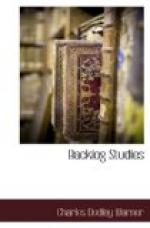Mandeville said further, that as to poetry, he did not know much about that, and there was not much he cared to read except parts of Shakespeare and Homer, and passages of Milton. But it did seem to him that we had men nowadays, who could, if they would give their minds to it, manufacture in quantity the same sort of epigrammatic sayings and legends that our scholars were digging out of the Orient. He did not know why Emerson in antique setting was not as good as Saadi. Take for instance, said Mandeville, such a legend as this, and how easy it would be to make others like it:
The son of an Emir had red hair, of which he was ashamed, and wished to dye it. But his father said: “Nay, my son, rather behave in such a manner that all fathers shall wish their sons had red hair.”
This was too absurd. Mandeville had gone too far, except in the opinion of Our Next Door, who declared that an imitation was just as good as an original, if you could not detect it. But Herbert said that the closer an imitation is to an original, the more unendurable it is. But nobody could tell exactly why.
The Fire-Tender said that we are imposed on by forms. The nuggets of wisdom that are dug out of the Oriental and remote literatures would often prove to be only commonplace if stripped of their quaint setting. If you gave an Oriental twist to some of our modern thought, its value would be greatly enhanced for many people.
I have seen those, said the Mistress, who seem to prefer dried fruit to fresh; but I like the strawberry and the peach of each season, and for me the last is always the best.
Even the Parson admitted that there were no signs of fatigue or decay in the creative energy of the world; and if it is a question of Pagans, he preferred Mandeville to Saadi.
ELEVENTH STUDY
It happened, or rather, to tell the truth, it was contrived,—for I have waited too long for things to turn up to have much faith in “happen,” that we who have sat by this hearthstone before should all be together on Christmas eve. There was a splendid backlog of hickory just beginning to burn with a glow that promised to grow more fiery till long past midnight, which would have needed no apology in a loggers’ camp,—not so much as the religion of which a lady (in a city which shall be nameless) said, “If you must have a religion, this one will do nicely.”
There was not much conversation, as is apt to be the case when people come together who have a great deal to say, and are intimate enough to permit the freedom of silence. It was Mandeville who suggested that we read something, and the Young Lady, who was in a mood to enjoy her own thoughts, said, “Do.” And finally it came about that the Fire Tender, without more resistance to the urging than was becoming, went to his library, and returned with a manuscript, from which he read the story of




